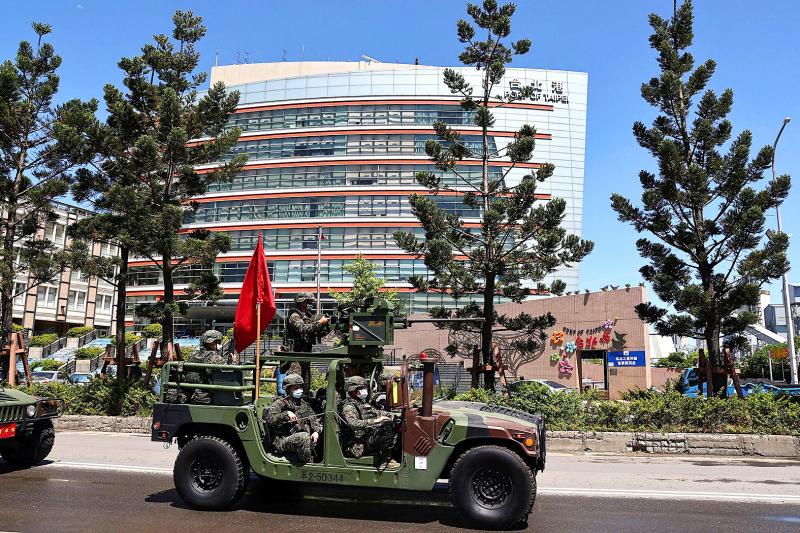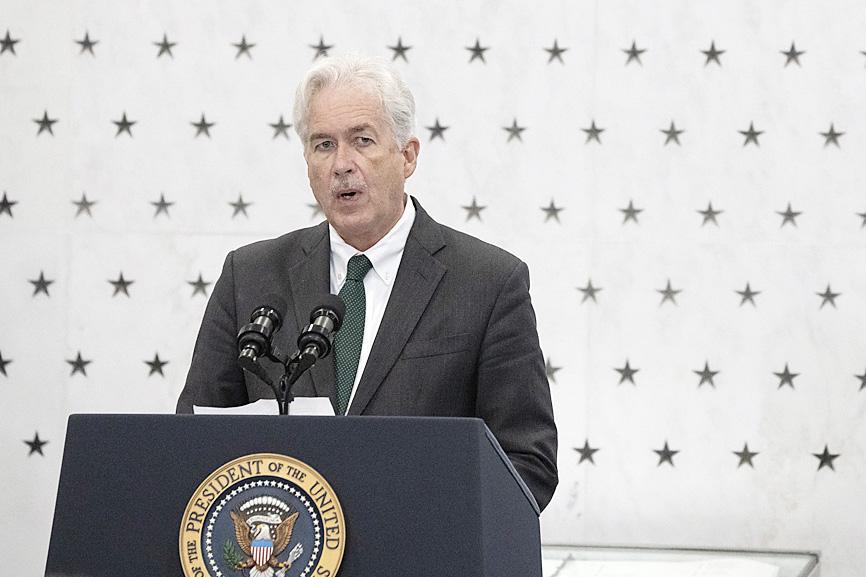China appears determined on using force in Taiwan, with Russia’s experience in Ukraine affecting Beijing’s calculations on when and how — not whether — to invade, the head of the CIA said on Wednesday.
Appearing at the Aspen Security Forum, CIA Director Bill Burns said that China likely saw in Ukraine that “you don’t achieve quick, decisive victories with underwhelming force.”
He played down speculation that Chinese President Xi Jinping (習近平) could move on Taiwan after a key Chinese Communist Party meeting later this year, but said the risks “become higher, it seems to us, the further into this decade that you get.”

Photo: Ann Wang, Reuters
“I wouldn’t underestimate President Xi’s determination to assert China’s control” over Taiwan, he said.
Burns said that China was “unsettled” when looking at Russia’s five-month-old war in Ukraine, which he characterized as a “strategic failure” for Russian President Vladimir Putin, who had hoped to topple the Kyiv government within a week.
“Our sense is that it probably affects less the question of whether the Chinese leadership might choose some years down the road to use force to control Taiwan, but how and when they would do it,” Burns said.

Photo: EPA-EFE
“I suspect the lesson that the Chinese leadership and military are drawing is that you’ve got to amass overwhelming force if you’re going to contemplate that in the future,” he said.
China also has likely learned that it has to “control the information space” and “do everything you can to shore up your economy against the potential for sanctions,” he said in a live interview with NBC News correspondent Andrea Mitchell.
Speaking before Burns at the forum in the Rocky Mountains, Chinese Ambassador to the US Qin Gang (秦剛) said that Beijing preferred “peaceful reunification.”
He also said that the US was supporting “independence” forces in Taiwan.
“No conflict and no war is the biggest consensus between China and the United States,” Qin said, adding that Washington was “hollowing out and blurring” its stated policy of only recognizing Beijing.
“Only by adhering strictly to the one China policy, only by joining hands to constrain and oppose Taiwan independence, can we have a peaceful reunification,” he said.
US President Joe Biden in May said that the US was ready to use force to defend Taiwan from a Chinese attack, appearing to shed the long-held US policy of strategic ambiguity on whether it would engage militarily, although the White House quickly walked his comments back.
Biden told reporters on Wednesday that he expected to speak to Xi “within the next 10 days.”

CHAOS: Iranians took to the streets playing celebratory music after reports of Khamenei’s death on Saturday, while mourners also gathered in Tehran yesterday Iranian Supreme Leader Ayatollah Ali Khamenei was killed in a major attack on Iran launched by Israel and the US, throwing the future of the Islamic republic into doubt and raising the risk of regional instability. Iranian state television and the state-run IRNA news agency announced the 86-year-old’s death early yesterday. US President Donald Trump said it gave Iranians their “greatest chance” to “take back” their country. The announcements came after a joint US and Israeli aerial bombardment that targeted Iranian military and governmental sites. Trump said the “heavy and pinpoint bombing” would continue through the week or as long

TRUST: The KMT said it respected the US’ timing and considerations, and hoped it would continue to honor its commitments to helping Taiwan bolster its defenses and deterrence US President Donald Trump is delaying a multibillion-dollar arms sale to Taiwan to ensure his visit to Beijing is successful, a New York Times report said. The weapons sales package has stalled in the US Department of State, the report said, citing US officials it did not identify. The White House has told agencies not to push forward ahead of Trump’s meeting with Chinese President Xi Jinping (習近平), it said. The two last month held a phone call to discuss trade and geopolitical flashpoints ahead of the summit. Xi raised the Taiwan issue and urged the US to handle arms sales to

State-run CPC Corp, Taiwan (CPC, 台灣中油) yesterday said that it had confirmed on Saturday night with its liquefied natural gas (LNG) and crude oil suppliers that shipments are proceeding as scheduled and that domestic supplies remain unaffected. The CPC yesterday announced the gasoline and diesel prices will rise by NT$0.2 and NT$0.4 per liter, respectively, starting Monday, citing Middle East tensions and blizzards in the eastern United States. CPC also iterated it has been reducing the proportion of crude oil imports from the Middle East and diversifying its supply sources in the past few years in response to geopolitical risks, expanding

Pro-democracy media tycoon Jimmy Lai’s (黎智英) fraud conviction and prison sentence were yesterday overturned by a Hong Kong court, in a surprise legal decision that comes soon after Lai was jailed for 20 years on a separate national security charge. Judges Jeremy Poon (潘兆初), Anthea Pang (彭寶琴) and Derek Pang (彭偉昌) said in the judgement that they allowed the appeal from Lai, and another defendant in the case, to proceed, as a lower court judge had “erred.” “The Court of Appeal gave them leave to appeal against their conviction, allowed their appeals, quashed the convictions and set aside the sentences,” the judges